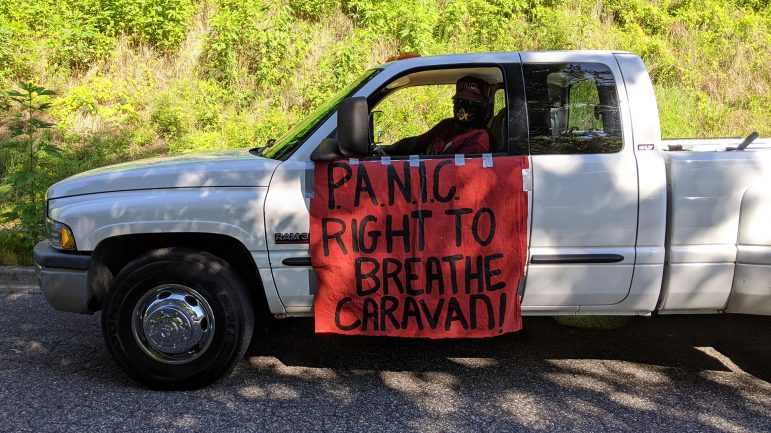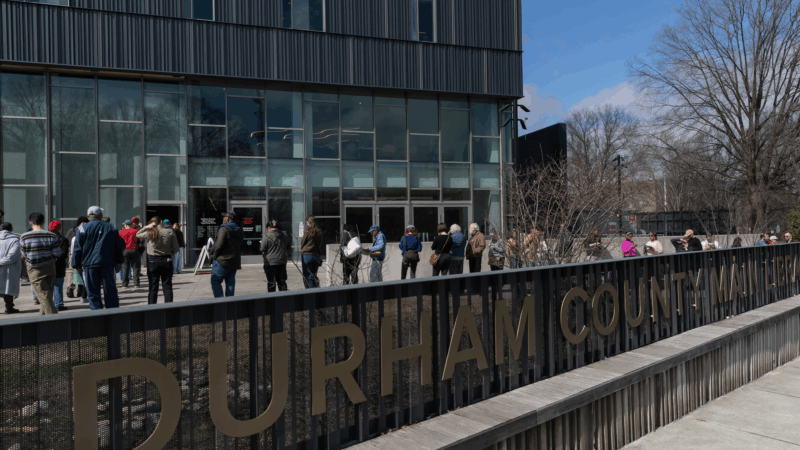Advocates Call For Environmental & Racial Justice At North Birmingham Superfund Site
Dozens of cars decorated with signs and posters formed a procession through the 35th Avenue Superfund site Saturday morning. Members of the “Right to Breathe Caravan” called for racial and environmental justice as they traveled through Fairmont, Collegeville and Harriman Park, north Birmingham neighborhoods that have faced decades of industrial pollution.
Charlie Powell, founder and president of the advocacy group People Against Neighborhood Industrial Contamination (PANIC), helped organize the event with several other groups including GASP and the Birmingham chapter of Black Lives Matter.
“We been fighting this for years and we ain’t been getting no justice,” Powell said. “This is an environmental injustice and we want relief, and we just going to have to start taking to the streets just like everybody else.”
The Environmental Protection Agency (EPA) declared part of north Birmingham a Superfund site almost a decade ago due to elevated levels of lead, arsenic and other carcinogens. The area is surrounded by industry, including two coke oven plants, steel producing facilities, quarries and asphalt batch plants. It was recently the subject of a federal bribery investigation involving a Birmingham lawyer, a Drummond coal executive and a state representative.
As part of the cleanup effort, EPA officials have spent years sampling affected neighborhoods and have removed contaminated soil from more than 400 properties. Powell said despite that, industry continues to pollute the area and many residents want the option to relocate to communities with cleaner air and soil.
This is included in a list of demands that the caravan group is proposing for state and local leaders. Advocates also want Gov. Kay Ivey to request to have the 35th Avenue site included on the EPA’s Superfund National Priorities List, and they want the Birmingham City Council to establish an advisory environmental justice commission.

Mary Scott Hodgin,WBHM
Charlie Powell leads the “Right to Breathe Caravan” through north Birmingham.
Michael Hansen, executive director of GASP, said the issues in north Birmingham have been festering for decades, lowering property values and increasing health disparities for the area’s predominantly Black population. He said Saturday’s event was largely inspired by recent calls for racial justice.
“The global uprisings after the murder of George Floyd presented an opportunity to highlight the way that environmental issues intersect with systemic racism and oppression,” Hansen said.
He said the COVID-19 pandemic has also further proven the need for health equity, as data shows minority groups are disproportionately affected by the virus.
The candy heir vs. chocolate skimpflation
The grandson of the Reese's Peanut Butter Cups creator has launched a campaign against The Hershey Company, which owns the Reese's brand. He wants them to stop skimping on ingredients.
Scientists make a pocket-sized AI brain with help from monkey neurons
A new study suggests AI systems could be a lot more efficient. Researchers were able to shrink an AI vision model to 1/1000th of its original size.
U.S. evacuates diplomats, shuts down some embassies as war enters fourth day
The United States evacuated diplomats across the Middle East and shut down some embassies as war with Iran intensified Tuesday while President Trump signaled the conflict could turn into extended war.
North Carolina and Texas have primary elections Tuesday. Here’s what you need to know
The midterm elections are officially underway and contests in Texas and North Carolina will be the first major opportunity for parties to hear from voters about what's important to them in 2026.
Kristi Noem set to face senators over DHS shutdown, immigration enforcement
The focus of the hearing is likely to be on how Kristi Noem is pursuing President Trump's mass deportation efforts in his second term, after two U.S. citizens were killed by immigration officers.
College students, professors are making their own AI rules. They don’t always agree
More than three years after ChatGPT debuted, AI has become a part of everyday life — and professors and students are still figuring out how or if they should use it.







